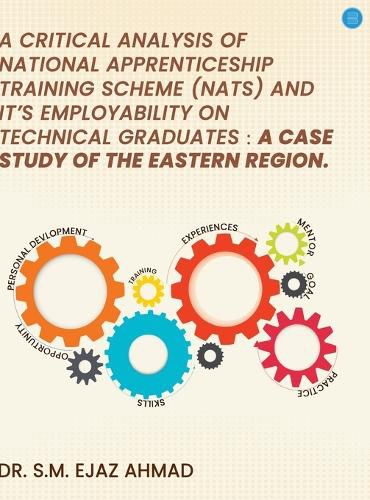Readings Newsletter
Become a Readings Member to make your shopping experience even easier.
Sign in or sign up for free!
You’re not far away from qualifying for FREE standard shipping within Australia
You’ve qualified for FREE standard shipping within Australia
The cart is loading…






This title is printed to order. This book may have been self-published. If so, we cannot guarantee the quality of the content. In the main most books will have gone through the editing process however some may not. We therefore suggest that you be aware of this before ordering this book. If in doubt check either the author or publisher’s details as we are unable to accept any returns unless they are faulty. Please contact us if you have any questions.
Human resource development policies place a strong emphasis on training and skill improvement. The scale of India's present technical training infrastructure is less than what is needed. There is also a sizable skill gap between what the market requires in terms of skills and what graduate and diploma programs have to offer. Not only is it difficult to establish a significant quantitative expansion of skill training facilities, but it's also difficult to improve their quality, which is a work that is just as significant. The institutional level's capacity for educational and training programs is insufficient to meet the rising demand for the necessary skill sets, knowledge, and experience. Apprenticeships have great promise in fostering our youths starting at the school level, especially with several industries experiencing significant skills deficits in the future. The National Apprenticeship Training Scheme (NATS) in India, which promotes "learning by earning" and "learning by doing," is a potent tool for skill development. Important changes have been made to "The Apprentices Act, 1961" to help freshly graduated students who are joining the workforce receive industrial training and exposure to contemporary industrial procedures. The BOAT (Boards of Apprenticeship Training), situated in Mumbai, Kanpur, Chennai, and the BOPT (Board of Practical Training), headquartered in Kolkata, are the four independent regional organizations through which the Ministry of Education (MoE) implements the program.
Despite its significance and the crucial role that skill development plays in the economy, it has been discovered that the topic has not recently been investigated. Therefore, it was crucial to investigate the facts of the apprentices' job and training experiences and the business community's opinions regarding NATS and the subject matter of such a scheme. Additionally, it will assist policymakers, academicians and industrialists in comprehending the gaps and choosing their future course of action. A CRITICAL ANALYSIS OF THE NATIONAL APPRENTICESHIP TRAINING SCHEME (NATS) ON EMPLOYABILITY OF TECHNICAL GRADUATES: A CASE STUDY OF THE EASTERN REGION has been published.
The report includes data from numerous stakeholders as well. The main areas of focus for the investigation were skill and employability development, the role of industries in closing trainees' skill gaps, the level of awareness about NATS amongst the passing graduates and successful industry-institute collaboration through set schedules, targeted group discussions, and spontaneous dialogues.
$9.00 standard shipping within Australia
FREE standard shipping within Australia for orders over $100.00
Express & International shipping calculated at checkout
This title is printed to order. This book may have been self-published. If so, we cannot guarantee the quality of the content. In the main most books will have gone through the editing process however some may not. We therefore suggest that you be aware of this before ordering this book. If in doubt check either the author or publisher’s details as we are unable to accept any returns unless they are faulty. Please contact us if you have any questions.
Human resource development policies place a strong emphasis on training and skill improvement. The scale of India's present technical training infrastructure is less than what is needed. There is also a sizable skill gap between what the market requires in terms of skills and what graduate and diploma programs have to offer. Not only is it difficult to establish a significant quantitative expansion of skill training facilities, but it's also difficult to improve their quality, which is a work that is just as significant. The institutional level's capacity for educational and training programs is insufficient to meet the rising demand for the necessary skill sets, knowledge, and experience. Apprenticeships have great promise in fostering our youths starting at the school level, especially with several industries experiencing significant skills deficits in the future. The National Apprenticeship Training Scheme (NATS) in India, which promotes "learning by earning" and "learning by doing," is a potent tool for skill development. Important changes have been made to "The Apprentices Act, 1961" to help freshly graduated students who are joining the workforce receive industrial training and exposure to contemporary industrial procedures. The BOAT (Boards of Apprenticeship Training), situated in Mumbai, Kanpur, Chennai, and the BOPT (Board of Practical Training), headquartered in Kolkata, are the four independent regional organizations through which the Ministry of Education (MoE) implements the program.
Despite its significance and the crucial role that skill development plays in the economy, it has been discovered that the topic has not recently been investigated. Therefore, it was crucial to investigate the facts of the apprentices' job and training experiences and the business community's opinions regarding NATS and the subject matter of such a scheme. Additionally, it will assist policymakers, academicians and industrialists in comprehending the gaps and choosing their future course of action. A CRITICAL ANALYSIS OF THE NATIONAL APPRENTICESHIP TRAINING SCHEME (NATS) ON EMPLOYABILITY OF TECHNICAL GRADUATES: A CASE STUDY OF THE EASTERN REGION has been published.
The report includes data from numerous stakeholders as well. The main areas of focus for the investigation were skill and employability development, the role of industries in closing trainees' skill gaps, the level of awareness about NATS amongst the passing graduates and successful industry-institute collaboration through set schedules, targeted group discussions, and spontaneous dialogues.